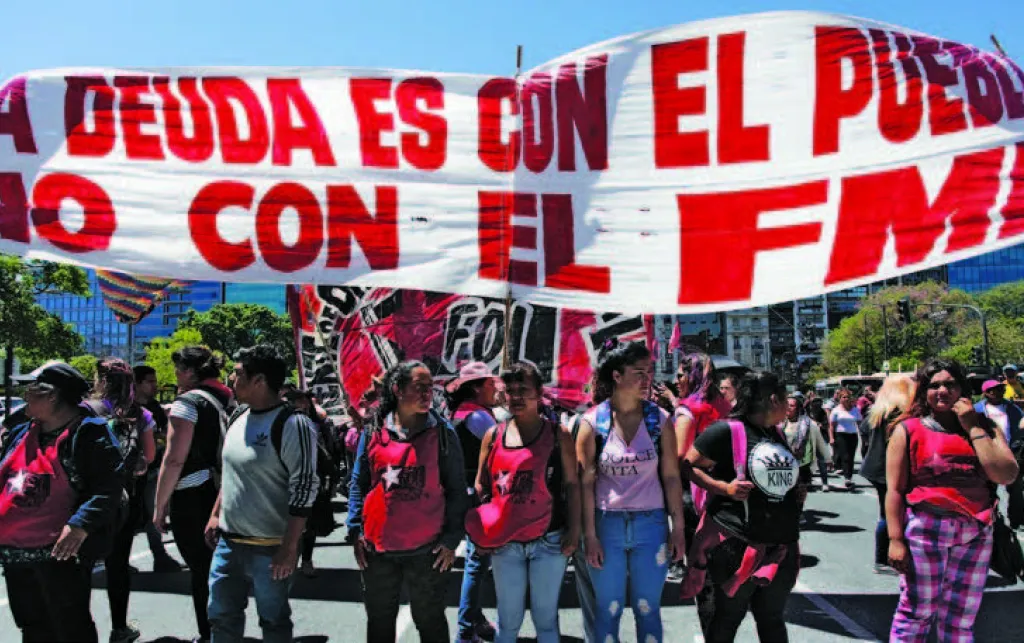Profiting from Poverty: The role of debt in the Global Economy

War on Want has always believed that poverty is political. From our long-standing advocacy for justice not charity, to our campaigns to expose the worst of corporate exploitation and greed, it is clear that poverty is the result of political decisions made by those who hold power: governments and corporations, working within a rigged global economic system. Wealth, power and influence have consolidated into the hands of a few.
The poorest 50% of the global population possess just 2% of global wealth, whereas the richest 10% own 76%
The gap between the richest and the poorest has grown exponentially to the extent that the poorest half of the entire global population now possess just 2% of global wealth, whereas the richest 10% own 76% of global wealth.1 At the centre of this power dynamic: the climate crisis, and the damage done to the Earth’s ecosystems in relentless pursuit of economic growth.
The global economic system is the result of colonialism. For centuries the countries of the Global North have dictated economic and financial rules to benefit their own interests leading to the plundering of nature, and the oppression and exploitation of communities from countries in the Global South. In so doing, causing and fuelling the climate crisis while destroying the very fabric of societies capable of adapting and building resilience to the worst of its impacts.
Countries of the Global South have been left carrying heavy debt burdens, indebted to financial institutions and private lenders. This traps them into a vicious circle where they spend more on debt repayments than on adapting to the climate crisis and, at the same time, pursue their right to development.

Through structural adjustment programmes, the International Monetary Fund (IMF) and World Bank forced governments into reforms in exchange for financial aid – reforms that led to commodity dependency, which can leave economies more exposed to shocks.2
There are a number of drivers of debt of Global South countries. Creditors push profitable loans, which they can leverage for more power and influence over the economic policies of a country in such a way that serves the lenders interests. Unequal trade rules, which have removed tariff protections for the goods and materials produced by Global South countries, have resulted in massive trade surpluses and deficits. This leaves countries in deficit needing to borrow to pay for traded goods, with Global South economies oriented towards production for export in service of Global North overconsumption rather than domestic need. This builds on centuries of shaping of the economic structure of Global South economies through colonisation and neo-colonial economic relations.3
Extreme climate disasters are now heavily exacerbating debt crises in many countries. Fierce flooding in Pakistan in 2022 displaced 33 million people, killed more than 1,400, and caused approximately $40 billion in property damage. The IMF approved a bailout loan for more than $1.1 billion, but Pakistan needs to borrow billions more for recovery when the country already has external debt of around $130 billion.4 Pakistan is responsible for less than 1% of global emissions, but ranks 8th among the countries most exposed to extreme weather,5 and already has a heavy debt burden.6
The poorest 50% of people on the planet contribute just 12% of total carbon emissions, while the richest 10% are responsible for 47.6%
The poorest 50% of people on the planet contribute to just 12% of total carbon emissions. Meanwhile, the richest 10% of people are responsible for 47.6%.7 Yet it is the poorest countries that face mountains of unmanageable debt in order to recover from climate devastation they did not cause.
Rising costs of living, lack of access to Covid vaccines, poverty, inequality and hunger, are combining, amplifying and fuelling an ecological crisis that is impacting the poorest the hardest. These are not separate or isolated crises, but the inevitable result of a system rigged to benefit rich elites and corporations to maximise profit and capture more of global wealth.
Debt is a key factor in how this rigged system is enabling the rich to maintain a stranglehold on the poorest and run roughshod over the natural world.
Find out more by downloading the report below.
Share this page
- 1//wir2022.wid.world/executive-summary/, 2022
- 2//unctad.org/news/strengthening-resilience-commodity-dependent-countries
- 3//static1.squarespace.com/static/620ef5326bbf2d7627553dbf/t/636f8be1d35f0875298db39b/1668254693836/COP27_Civil_Society_Equity_Review_Report_SCREEN.pdf
- 4//www.ft.com/content/f4b04f39-8b9d-463d-8e95-ebb0d1514e21
- 5//balkangreenenergynews.com/pakistan-climatedisaster-biggest-emitters-should-take-responsibility-and-help/ and Global Climate Risk Index, 2021, https://www.germanwatch.org/en/19777
- 6//www.usip.org/publications/2023/04/pakistansexistential-economic-crisis#:~:text=Pakistan%27s%20large%20external%20debt%20comes,this%20is%20a%20hefty%20burden.
- 7//devinit.org/resources/inequality-global-trends/ and World Inequality Lab, 2021. World Inequality Report 2022. Available at: https://wir2022.wid.world/www-site/uploads/2021/12/WorldInequalityReport2022_Full_Report.pdf

